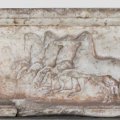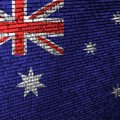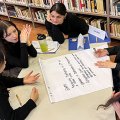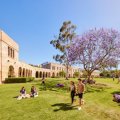
University of Queensland graduate Abigael Mawby will move from Iran to New York to study anti-corruption law after winning a prestigious John Monash scholarship.
Ms Mawby is currently working in Iran for the United Nations Office on Drugs and Crime (UNODC) in the area of crime, justice and corruption in Iran and throughout the Middle East and North Africa, and hopes to start post-graduate studies at Columbia University (New York) in September.
She said the scholarship provided a tremendous opportunity to study anti-corruption law at one of the world’s leading universities.
“It will help sharpen my knowledge, refine my goals and participate in a global debate about a topic that fascinates me. I don’t think that opportunity can be underestimated,” she said.
John Monash scholarships, which are valued at $60,000 per year for a maximum of three years, are awarded to outstanding Australians with leadership potential who wish to study overseas.
Ms Mawby graduated from UQ with a Bachelor of Arts and Bachelor of Laws (first class honours) in 2015 and is one of 17 Australians to win the John Monash Scholarship this year.
She travelled extensively while studying at UQ, taking advantage of internship and volunteer opportunities with the UQ Abroad and UQ Advantage Award programs.
Ms Mawby presented research on targeted financial sanctions at the U21 Undergraduate research conference in Tokyo, competed in the Philip C Jessup International Law Moot Competition in Washington DC, and undertook a student exchange in Istanbul through her arts subjects that led to a position with the European Court of Human Rights.
At the European Court of Human Rights, Ms Mawby met representatives from the UNODC, leading to her current position in Iran.
“The arts aspect of my degree gave me an invaluable understanding of the political dynamics and historical development of international law, which cannot be examined without context,” Ms Mawby said.
“I’ve been working for UNODC for the past month and I’m writing on asset recovery and financial sanctions, in addition to work on the financing of terrorism.
“It is an incredibly interesting time to be witnessing change in Iran, as the lifting of sanctions has signalled a more expansive foreign policy, deeper engagement with international organisations and a renewed interest in foreign trade.”
Media: UQ Humanities and Social Sciences, Gillian Ievers, g.ievers@uq.edu.au, 07 3346 1633.
.jpg)











